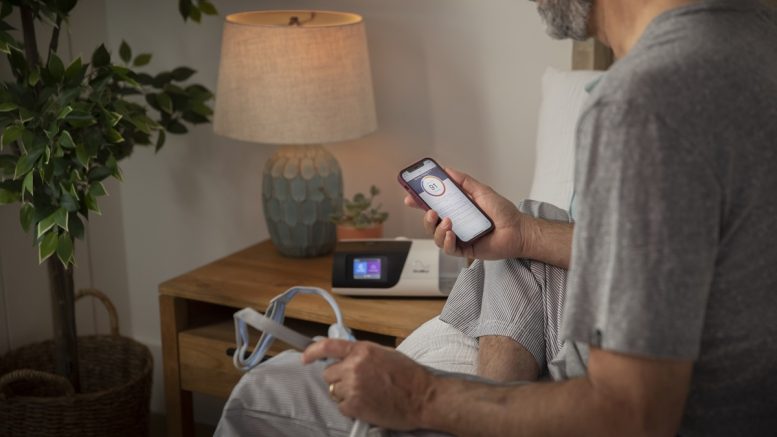Tackling non-communicable diseases (NCDs) like cardiovascular disease, diabetes, and mental health disorders was a key topic at the European Health Summit this year and will continue to be a focus point for the European Union as we head into 2025. Sleep health is a significant contributor to these diseases[1] [2] [3]; however, it is often overlooked. To mitigate this and improve patient outcomes, there must be a heightened emphasis on addressing sleep conditions, particularly obstructive sleep apnoea (OSA).
Today, nearly one billion people worldwide suffer from OSA[4], 80% of whom are still undiagnosed.[5] Additionally, 10 to 15% of the global population are affected by insomnia[6], with some of these individuals potentially having comorbid OSA. Undiagnosed sleep disorders aggravate and accelerate NCD symptoms. We should, therefore, always seek to innovate to address sleep issues and disorders that burden individuals, impact chronic diseases as well as tax the healthcare system.
Adopting a technology driven mindset for clinical research and health solutions
Evaluating underlying factors and developing technology-driven solutions opens new opportunities for improved patient outcomes, prevention, and the promotion of healthy ageing across Europe. Through strong engagement with patients and continuous partnerships with public, academic and other stakeholders, we aim to accelerate the adoption of digital health technologies (DHTs) to scale the availability of solutions and treatments for many sleep conditions including OSA and other sleep disorders, including insomnia, which directly impact NCDs.
A holistic, multi-faceted approach is needed to improve the patient pathway, and digital health solutions must be a part of this. The WHO recently published a report[7] that discusses the benefits of Digital Health Technology and how boosting digital health can help prevent millions of deaths from non-communicable diseases in the next decade, as well as help address the current shortage of hospital staff.
Healthcare companies can also embark on clinical and healthcare outcomes research to determine the effectiveness of their innovative solutions on patient outcomes and the broader healthcare system. For example, ResMed’s supported ALASKA study – a large-scale analysis of a cohort of 176,000 individuals treated with CPAP in France – based on data from the French National Health insurance reimbursement system for new CPAP users. Through the analysis, the impact of CPAP treatment on long-term survival was explored and it was found that those who continued CPAP had a 39% better chance of survival than those who stopped their CPAP within the first year.
Along with tracking the effectiveness of new solutions, digital health has bolstered the ability to diagnose and elevate the quality-of-care patients receive. In the UK, the National Health Service’s strategic partnerships with private technology firms helped the rapid deployment of remote care solutions, allowing Health Care Professionals to monitor over 12,000 COVID patients remotely within just three months of implementation, promptly addressing health concerns, and reducing the strain on hospital resources.
OSA and technology driven strategies for sleep health
In the US, the cost of undiagnosed OSA is approximately $150 billion, highlighting the importance of accessible diagnosis-to-treatment pathway for these patients. By treating 80% of OSA patients with digital health solutions, we could save up to $50 billion annually worldwide in healthcare costs and regain productivity.[8] But despite their effectiveness, we are continuing to face challenges when it comes to the adoption of DHTs. Lack of reimbursement structures that incentivise prescribing new solutions, and a low level of awareness among medical professionals about the importance of sleep as a foundational pillar of health are two important factors that can delay the adoption of DHTs.
As digital health technologies continue to evolve, new approaches and innovative solutions are emerging that hold tremendous potential for advancing healthcare overall. I believe it is up to healthcare leaders and policymakers to spread the word about enhanced innovation and the benefits of the deployment of digital health technologies that can help address the burden of sleep disorders and non-communicable diseases more broadly. By weaving sleep health into the digital health conversation, public health strategies, and everyday practice, well-being will be positively impacted. Not only will this help improve patients’ lives, but it will also reduce pressure on national health services and contribute to a more sustainable and efficient health service for decades to come.
By Carlos Nunez, Chief Medical Officer, ResMed
References
[1] Redline, S., et al. (2010). The effects of obstructive sleep apnea on cardiovascular disease and stroke. Nature Reviews Cardiology, 7(5), 277-285.
[2] Kent, B. D., et al. (2014). Obstructive sleep apnea and diabetes: Epidemiology and pathophysiologic insights. Chest, 146(4), 967-973.
[3] Nutt D, Wilson S, Paterson L. Sleep disorders as core symptoms of depression. Dialogues Clin Neurosci. 2008;10(3):329-336. doi:10.31887/DCNS.2008.10.3/dnutt
[4] Benjafield, A. V., et al. (2019). Global prevalence of obstructive sleep apnea in adults: Estimation using currently available data. The Lancet Respiratory Medicine, 7(8), 687-698.
[5] Goyal M, Johnson J. Obstructive Sleep Apnea Diagnosis and Management. Mo Med. 2017;114(2):120-124.
[6] Kaur H, Spurling BC, Bollu PC. Chronic Insomnia. [Updated 2023 Jul 10]. In: StatPearls [Internet]. Treasure Island (FL): StatPearls Publishing; 2024 Jan-. Available from: https://www.ncbi.nlm.nih.gov/books/NBK526136/
[7] World Health Organisation : Boosting digital health can help prevent millions of deaths from noncommunicable diseases. September 2024
[8] Frost & Sullivan Report (2016) – Hidden Health Crisis Costing America Billions: Underdiagnosing and Undertreating Obstructive Sleep Apnea Drains Healthcare System.



